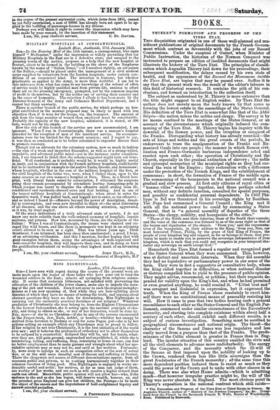HISS NIGHTINGALE.
_London, 17t1e January 1855. Sin—I have Been with regret during the course of the present week at- tacks made upon the leader of those ladies who have gone out to tend the wounded soldiers in the East ; attacks all springing from religious animo- sity. It seems that sectarian bitterness, not satisfied with preventing the education of the children of the lower classes, seeks also to impede the nuns- of the sick and wounded. Does it not occur to such theological metaphy- mamma as I am now speaking of, that while they are hair-splitting about theories of which they have no means of testing the truth, and arguing about abstract questions they have no data for determining, Miss Nightingale is carrying out the eminently practical doctrines of our religion ? Whatever gradation of Christianity she may belong to, from the Highest Illtramontane to the Lowest Independent, she is acting upon the cardinal principle of cha- rity, and doing to others as she, or any of her detractors, would be done by. Nay, more—if she be no Christian—if she be any of the persons enumerated in the Prayer-book, Jew infidel, fidel, or heretic—whether her energy be derived from devotion to'Brahma or zeal for some Pagan god—she is by her actions setting an example which any Churchman may be proud to follow. If her religion be not true Christianity, it is the best imitation of it the world ever saw; • and it behoves the professors of orthodoxy not to allow themselves to be eclipsed by a counterfeit. Eclipsed they will be, and her tenets, what- ever they are,, will gain ground, unpreached and unpublished, if, while she is ministering, toiling, and suffering, they, remaining at home at ease, can find no better employment than to make guesses and wrangle about what her spe- culative opinions may or may not be, and cavil at her motives. Fortunate- ly, none seem to indulge in such an occupation either at the seat of actual war, or at the still more dreadful seat of disease and suffering at Scutari. There the clergymen and nurses of different denominations appear, from all accounts public and private,, to be working harmoniously together in their common vocation Of doing good. Miss Nightingale is engaged in works un- deniably useful and noble ; -her motives, as far as man can judge of them are worthy of her works, and are such as will receive a higher reward than earth can afford. Meanwhile public opinion will not allow her—who, if she -endures to the end as she has begun, will deserve wealth, honour, ay, and the proudest prize England can give her children the Peerage—to be made the object of the sneers and the imputations of half-enlightened bigotry and narrow-minded prejudice.
I am, Sir, your obedient servant,
A PitarzsrAfer EueassnarArr.


























 Previous page
Previous page